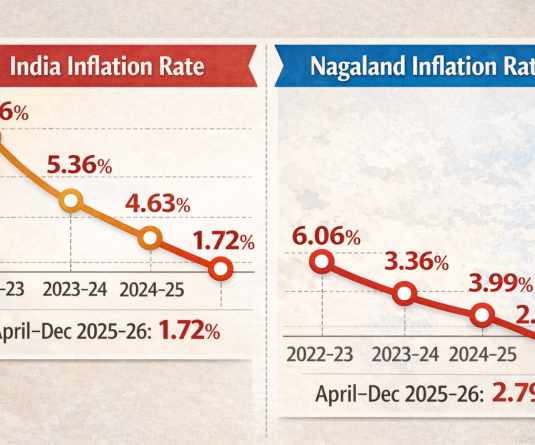Rev Dr Wati Aier. (Morung File Photo)

Morung Express News
Dimapur | May 14
In the annals of Naga political history, two significant events are regarded as pivotal markers responsible for shaping the democratic aspirations of its people. The first is the Naga Club’s submission of memorandum to the Simon Commission on January 10, 1928. Later in May 16, 1951 another important milestone was the Naga Plebiscite day, spearheaded by the Naga National Council (NNC).
Fast-forward 73 years later, the Forum for Naga Reconciliation (FNR) has endeavoured to mark the day (Naga Plebiscite) as a momentous occasion of remembering the past and forging ahead through common ties of belonging.
The event will take place on Thursday, May 16 at the Nagaland Baptist Church Council (NBCC) Convention Centre in Kohima, attended by Naga Political Groups (NPGs), apex Naga civil society organisations (CSOs), church leaders and a host of other dignitaries.
For Rev Dr Wati Aier, Convenor of FNR, the 74th Naga Plebiscite Day will be an occasion of thanksgiving, honouring past leaders such as AZ Phizo and the NNC at a crucial juncture of the Naga political movement.
Naga Plebiscite, a historical reality
The years following up to 1951 had been an anxious time for the people living in the Naga Hills. After the formation of the Naga National Council (NNC) in 1946 led by Phizo, negotiations had been in process to decide on the fate of the people. As the Government of newly independent India had repeatedly rejected any ideas of a separate and distinct Naga homeland, the NNC held a plebiscite on May 16, 1951. According to the NNC, almost 99% of the populace who had participated favoured complete separation from India.
Rev Aier, who at the time had been residing in Kohima, recalled “I was about four years old and I could vividly remember hearing people shouting and cheering as my father told me that thumb impression (plebiscite) was being held.”
He explained that during those days, commuting between the different Naga inhabited areas was of the most difficult nature. “You barely had any vehicles or roads to speak of,” he said, yet the feat achieved by the NNC of traversing the length and breadth of every village speaks volumes given the limitations.
Modern scholars may criticise the way it was conducted, yet none can dispute that Naga plebiscite was not a historical reality, Rev Aier stated. “Our history is not a subjective truth…People who saw and lives through it are still alive today,” he said.
A spring board for constructing realistic objectives
Nevertheless, in the present context of the Indo-Naga peace process, the FNR Convenor asserted that observing Naga Plebiscite Day together with the people is a crucial step towards bridging differences caused by tribalism and regionalism.
Rather than being mere symbolic gestures of Naga unity, it can be a springboard for constructing realistic objectives in the years to come, he said.
Rev Aier termed these ‘historic’ events as “identity markers” of the Naga people providing a basis from which they can draw meaning and purpose.
At the same time, he stressed that Nagas have should not live in a world of idealism as “we have done so for the last 70 years.”
“I don’t think there is such thing as Greater Nagalim, rather there is ‘Naga Land’ consisting of all the Naga inhabited areas irrespective of current political boundaries,” he said, as envisioned by Phizo and the other NNC leaders.
He noted that today, the world has become more complex including ethnic complexities that exist in the North-East region as well. As such, we require practical approaches to augment the idea of integration, be it building physical infrastructures, investing in human resources and upliftment of people’s livelihoods through quality education and skill development.
Ongoing Indo Naga peace process
In regard to the recent ouster of N Kitovi Zhimomi as GPRN/NSCN General Secretary, the FNR Convenor admitted that it will have significant implications on the ongoing talks with the Government of India.
Zhimomi, as the Convenor of the Working Committee, Naga National Political Groups (WC, NNPGs), had been instrumental in signing the ‘September Joint Accord.’
“In many ways it will slow the process, but we remain in touch with the groups,” Rev Aier stated.
But so far they have been very self-controlled without going out to the public domain accusing each other, he added, “Whatever it is, work it out amongst yourselves.”
He further reiterated the fact that FNR is a neutral body which possesses no authoritative power. Moreover, it does not condone collection of taxes or support factionalism.
Contextualising Naga history
So for the Naga people to embrace their own history in the present context, Rev Aier asserted that history is created by the people and not by any political group or organisation. Right now, “We seem to associate Naga history with factions,” he said.
Instead, it is important that people and most importantly the youths must find the truth which is always somewhere in the middle. “They are not the keepers of history.”
“So Naga Plebiscite Day is not a romantic memory; but a hopeful memory for the future,” he asserted.




